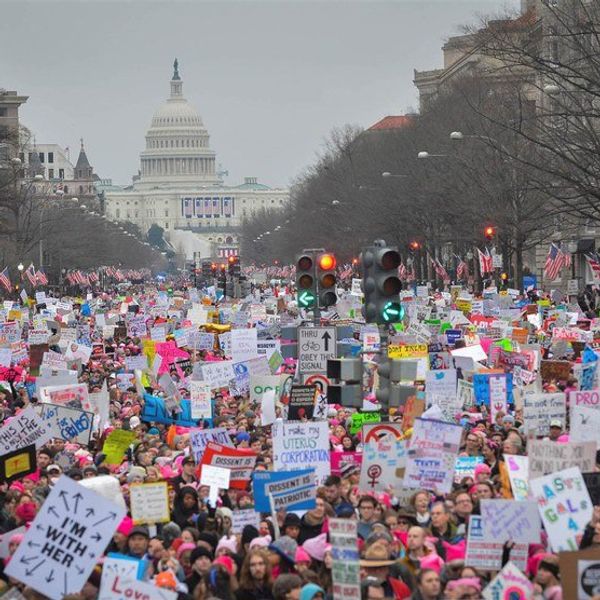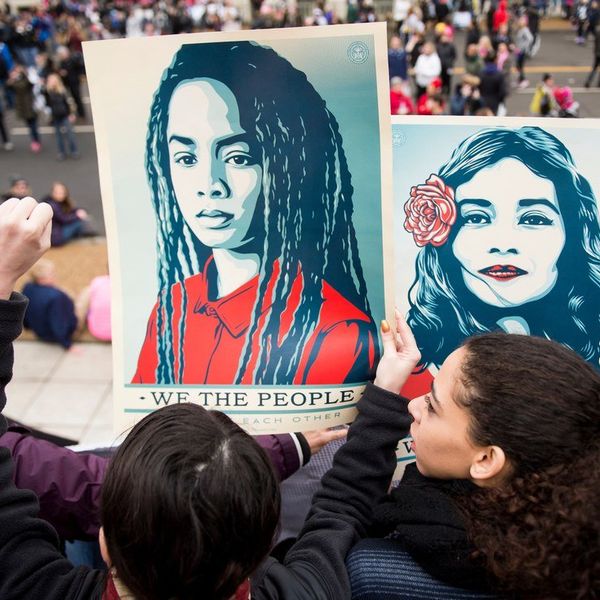Last weekend the world staggered as millions of people--women, men, children of all ages and ethnicities--joined hands to stand for their beliefs in women's rights, human rights, and human dignity for all. Marches were organized all over the U.S. in central cities such as D.C., WA, Portland, ME, Key West, FL, and Austin, TX. Other nations united in international capitals including Paris, Athens, Warsaw, and Stockholm.
The march participants (also self-proclaimed protestors) who were unified by the organization supporting the official Women's March On Washington stood under "solidarity" (basically unity) in protesting the "rhetoric of the past election cycle that has insulted, demonized, and threatened" minority groups and women, according to their website. The "rhetoric" referred to obviously stems from Trump and the countless recordings of him (all across the course of his some-odd-70 years) making insensitive, lewd, degrading, and unjust comments about women, paired with his political focus to crack down on illegal immigration during his presidency.
As a female college student, my interest in women's rights can hardly be disputed. The path that my country takes will take me with it, and as a humanitarian looking into third-world aid as a career field, I have adamant views about the intrinsic respect that should be commanded towards every human individual, whether male or female, black, white, oriental, European, Hispanic, LGBTQ, straight, liberal or conservative, young or old, rich or poor, employed or not.
From this standpoint, the march for women has proved immensely powerful for the mindfulness of the American people towards human rights. Four million American citizens will not unite to no end, and indeed they did not. Women's rights and the rights of the minority are at the forefront of news and politics more ever this election cycle, as arguably they have been for decades. It took a hundred years for women to be amended to the right to vote in the U.S. Constitution in 1919, due to the support of American citizens, male and female. Women have been voting for almost a hundred years, and their collective voice is claiming more weight with each year.
Racial minorities are also among first concerns in politics. Even before women's suffrage, in 1870, provisions were made for American black citizens to vote; however, it took Lyndon B. Johnson's signature in 1965 to remove unfair legal obstacles from Southern black voters.
Voices are being heard more clearly and loudly than ever before.
There were also protestors on Saturday, however, who were a little further from the heart of the Women's March on Washington, protestors who were turbulently marching, wielding sexually explicit signs displaying verbally abusive terms for women.
As a 20-something female, I do not support this approach to free speech, and I would not go astray in writing that not many people do. As a woman, I cannot justify sexually explicit displays, even in the name of women's rights. I cannot justify any type of explicit language in the name of women's rights or the rights of the minority. Martin Luther King Jr. changed the face of a nation without violence or explicit content; let us and our brothers and sisters do the same.
It is difficult to maintain, in this 21st Century of media and fake news, a respectable platform for one's political views, and being disgraceful to one's own biological sex to prove a point is contradictory to the true heart of the Women's March on Washington, which by definition fights cruel rhetoric and crude language towards women and advocates respect and honor.
The peaceable, respectful aspect of the March is the most important aspect for those participants whose intentions were wholly centered and whose actions were legal, kind, peaceable, and purposeful.
One aspect of these intentions, however honorable, I cannot condone, even as a 20-something woman.
Comparing the U.S. to other countries around the world, we are centuries ahead in regards to woman rights. As a woman, I am attending school with solid scholarships and graduated from high school with high marks. As a woman, I can vote in all elections, state and national. As a woman, I can pioneer a business, write and publish a book, work respectably in the workplace, and be independent for my whole life, if I so desire.
In Yemen, a woman is counted as only half a witness in court and can't leave the house without their husband's permission. In Saudi Arabia, women can't vote or drive, and can even be charged with criminal offense as a rape victim (yes, victim). In Islamic countries, women are persecuted violently if they pursue education, and are married off at premature ages to men of their traditional family's selection. Schools for girls have been burned. You are likely familiar with the girl Malala, whose persistent, patient attendance in school earned her a bullet in the head and later, a Nobel Peace Prize and a huge platform from which to advocate women's education.
These, these are the truest heart of Women's Rights that have yet to be established worldwide. From this perspective, the issues of mere impersonal verbal abuse by a crass old man on television is hardly worth its time.
“There are two ways to be fooled," Søren Kierkegaard wrote. "One is to believe what isn't true; the other is to refuse to believe what is true.”
Call me a stoic, but I believe that everyone has the ability to refuse to grant power to their persecutors by merely refusing to allow those words of hatred to have any weight. Ladies, we give Trump power over us when we allow his foolish words from many years ago to find a burning point in our heart. To tear all power abruptly away from all words of insult and degrading is to lift our chins and continue forward, ever confident, ever unperturbed by foolishness, ever still; monuments to the dignity of the human race.
There is only one aspect remaining in the supporting principles of the Women's March that I, as a 20-something woman, cannot condone, and it is this one contradiction: marching for human rights, while refusing to acknowledge the rights of the smallest, most minor, most overlooked citizens of all. The smallest minority, with no voice.
My concern is not to remove power of we women over our bodies--that is a given. My concern is for the diminutive persons who depend wholly on our female bodies for survival.
And those, my friends, my brothers and sisters, black, brown, white, conservative and liberal brothers and sisters, are my views as a female 20-something on the Women's March on Washington.





















